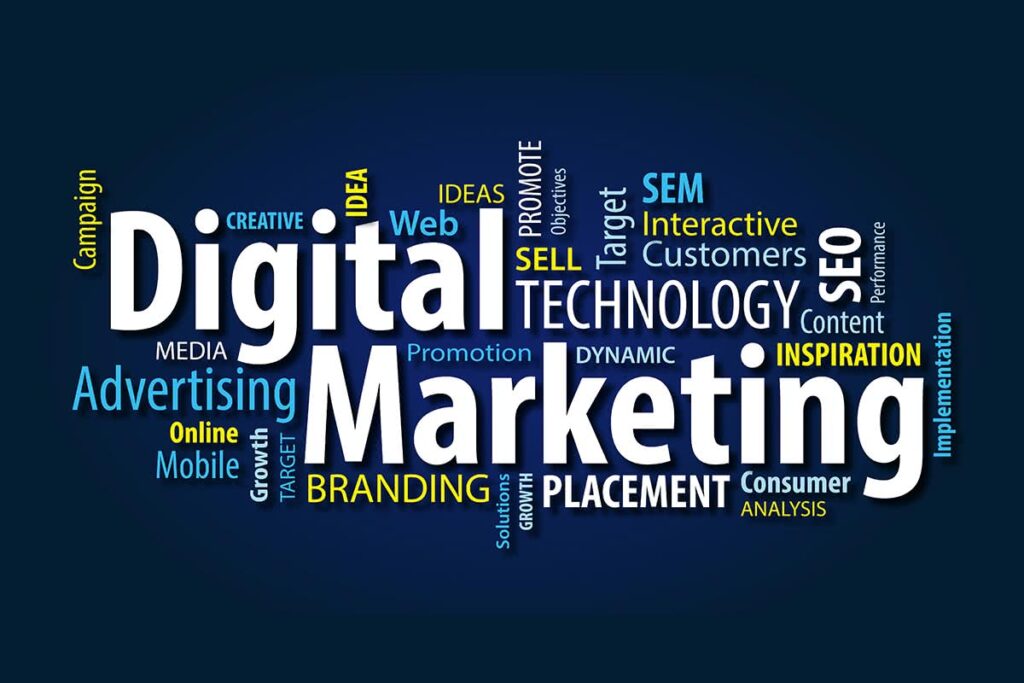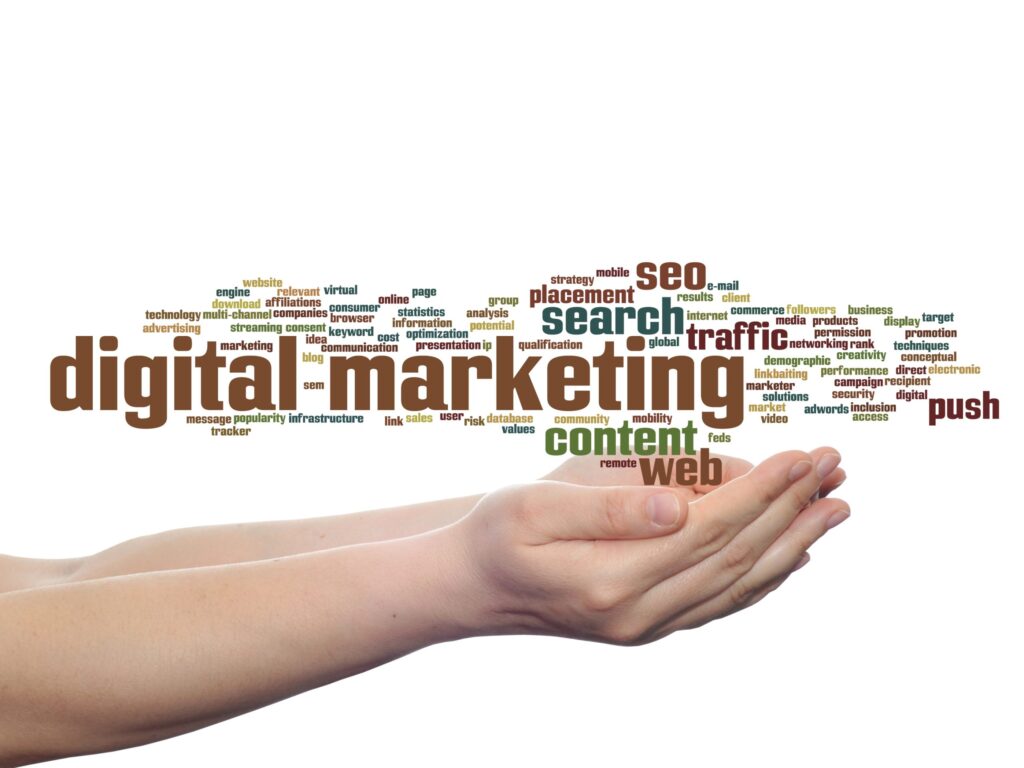Introduction
Businesses must adjust to new strategies for engaging consumers, boosting brand awareness, and spurring growth in the fast-paced, digital marketing world of today. In a global, digital -first marketplace, traditional marketing strategies are no longer enough to succeed. Digital marketing is the game-changer in this situation.
The advertising of goods and services using digital channels, including websites, email, social media, and search engines, is known as digital marketing. Businesses must become proficient in digital marketing if they want to prosper in the digital age, since more and more customers are using digital platforms for entertainment, education, and purchasing.
This article examines the essential elements of digital marketing, its significance, and the ways in which companies can benefit from it in order to expand and succeed.

Understanding Digital Marketing
- Any marketing campaign that makes use of an electronic device or the internet is considered digital marketing. It encompasses a wide range of methods, approaches, and resources meant to reach and interact with consumers in digital spaces. Among the fundamental elements of digital marketing are:
- The practice of improving a website to appear higher in search engine results pages (SERPs) is known as search engine optimization, or SEO. Businesses can raise their chances of being found by potential clients by increasing website visibility and drawing in organic traffic.
- Content Marketing: To draw in and keep a target audience interested, content marketers produce and disseminate worthwhile, timely, and consistent material. eBooks, videos, blogs, and social media posts are some possible formats for this content. High-quality content establishes your business as an authority in your sector and helps you gain the trust of your customers.
- Using social media sites (including Facebook, Instagram, LinkedIn, Twitter, and TikTok) to advertise goods and services is known as social media marketing. It’s an effective technique for increasing website traffic, interacting with consumers, and establishing a brand’s presence.
- Email marketing is a direct communication method that entails sending tailored messages to current or prospective clients. It works very well for building client loyalty, marketing new items, and nurturing leads.
- Businesses that use the pay-per-click (PPC) advertising strategy must pay a fee each time one of their ads is clicked. PPC advertising is available on well-known platforms like Google Ads and Facebook Ads. PPC enables companies to quickly increase website traffic and target particular client segments.
- Affiliate marketing is the practice of collaborating with people or businesses (affiliates) to sell your goods or services in return for a cut of the sales that result from their advertising. It’s an affordable method of expanding your audience.
- Influencer marketing is the practice of working with well-known online personas or social media influencers who have a sizable fan base. Businesses can market their goods to a larger, more interested audience by utilizing their influence.
- The process of managing a brand’s reputation and connections with bloggers, influencers, and online media is known as online public relations, or PR. It include obtaining favorable press coverage, controlling client testimonials, and answering questions or grievances raised online.
- Promoting goods, services, or brand messages through video content is known as video marketing. Strong venues for video marketing that can boost engagement and conversion rates include YouTube, TikTok, and Instagram.

Understanding Digital Marketing
- Any marketing campaign that makes use of an electronic device or the internet is considered digital marketing. It encompasses a wide range of methods, approaches, and resources meant to reach and interact with consumers in digital spaces. Among the fundamental elements of digital marketing are:
- The practice of improving a website to appear higher in search engine results pages (SERPs) is known as search engine optimization, or SEO. Businesses can raise their chances of being found by potential clients by increasing website visibility and drawing in organic traffic.
- Content Marketing: To draw in and keep a target audience interested, content marketers produce and disseminate worthwhile, timely, and consistent material. eBooks, videos, blogs, and social media posts are some possible formats for this content. High-quality content establishes your business as an authority in your sector and helps you gain the trust of your customers.
- Using social media sites (including Facebook, Instagram, LinkedIn, Twitter, and TikTok) to advertise goods and services is known as social media marketing. It’s an effective technique for increasing website traffic, interacting with consumers, and establishing a brand’s presence.
- Email marketing is a direct communication method that entails sending tailored messages to current or prospective clients. It works very well for building client loyalty, marketing new items, and nurturing leads.
- Businesses that use the pay-per-click (PPC) advertising strategy must pay a fee each time one of their ads is clicked. PPC advertising is available on well-known platforms like Google Ads and Facebook Ads. PPC enables companies to quickly increase website traffic and target particular client segments.
- Affiliate marketing is the practice of collaborating with people or businesses (affiliates) to sell your goods or services in return for a cut of the sales that result from their advertising. It’s an affordable method of expanding your audience.
- Influencer marketing is the practice of working with well-known online personas or social media influencers who have a sizable fan base. Businesses can market their goods to a larger, more interested audience by utilizing their influence.
- The process of managing a brand’s reputation and connections with bloggers, influencers, and online media is known as online public relations, or PR. It include obtaining favorable press coverage, controlling client testimonials, and answering questions or grievances raised online.
Also Read: https://trendspotter.online/business-insurance-a-comprehensive-overview/
Digital marketing has a number of benefits over traditional marketing strategies in the current digital environment. Here are some reasons why digital marketing is essential to the success of any business:
Greater Global Accessibility and Reach: Businesses may more easily access new markets thanks to the internet, which links billions of people worldwide. Digital marketing, as opposed to conventional techniques like print advertising, enables companies to reach people worldwide.
Cost-Effectiveness: Compared to traditional marketing strategies, digital marketing is frequently less expensive. Businesses may market their goods and services efficiently and affordably with choices including email marketing, social media ads, and content production.
Improved Personalization and Targeting: Digital marketing makes it possible to target customers precisely based on a variety of criteria, including geography, age, gender, interests, and behavior. This increases conversion rates by enabling companies to send prospective clients tailored marketing communications.
Data-Driven Insights and Analytics: The capacity to assess and monitor campaign performance in real-time is one of the biggest benefits of digital marketing. Social media insights and Google Analytics are two examples of tools that help firms make data-driven decisions and improve their strategies.
Improved Customer Engagement: Direct communication with customers is made easier by digital marketing platforms like email and social media. Using these channels to interact with clients enables companies to establish rapport, reply to questions, and promptly address problems.
Flexibility and Agility: Digital marketing initiatives are easily scalable, optimized, and modified. Digital marketing enables companies to make adjustments in real-time based on performance, unlike traditional approaches that could take a lot of time and money to adjust.
Key Strategies to Master Digital Marketing
Now that we know how important digital marketing is, let’s explore some practical ways to become experts at it and revolutionize your company in the digital age.
1. Develop a Comprehensive Digital Marketing Plan
A thoughtful plan is the foundation of any successful digital marketing approach. Your budget, target market, business goals, and the precise digital marketing strategies you want to employ should all be included in your plan. To guarantee that your marketing initiatives are constant and targeted, your plan should be in line with your company’s objectives.

2. Optimize Your Website for SEO
One of the best strategies to boost natural traffic to your website is through SEO. You can raise your website’s search engine ranks and draw in more people by optimizing it for relevant keywords, speeding up loading times, and making it easier to use on mobile devices.
The following are some crucial SEO techniques:
- Conduct keyword research to find the terms and phrases that people in your target market are using. Make use of these keywords in the URLs, meta tags, and content of your website.
- On-Page Optimization: To increase search engine visibility, optimize the headings, titles, graphics, and structure of your website.
- Link Building: To increase your site’s authority in search engine rankings, obtain high-quality backlinks from reputable websites.
3. Leverage Content Marketing to Engage and Educate Your Audience
A long-term tactic that positions your company as a thought leader in your sector is content marketing. Provide useful, educational content that speaks to the requirements of your audience. Blog entries, videos, infographics, case studies, and e-books may fall under this category.
Conclusion
The way that companies connect and interact with their audiences has been completely transformed by digital marketing. Businesses may raise brand awareness, boost traffic, and increase conversion rates by being proficient in the fundamentals of digital marketing, such as SEO, content marketing, social media, PPC advertising, and email campaigns.
In order to revolutionize your company in the digital age, you must create a thorough plan, keep abreast of new developments, and constantly assess and improve your work. By doing this, you’ll set up your brand for long-term success, growth, and a competitive advantage in the rapidly changing digital market.
